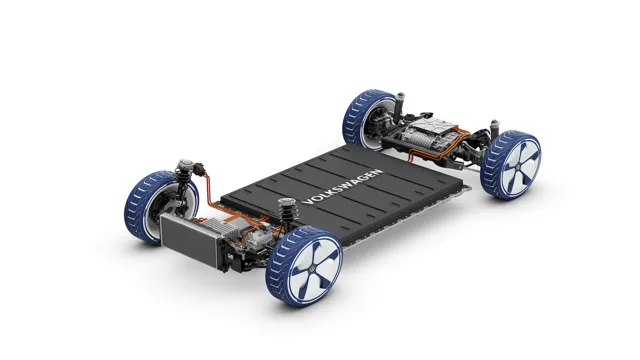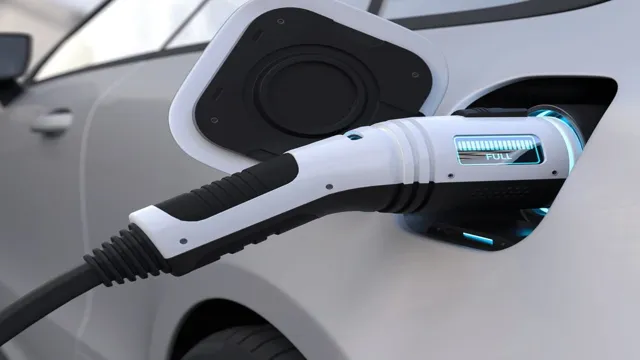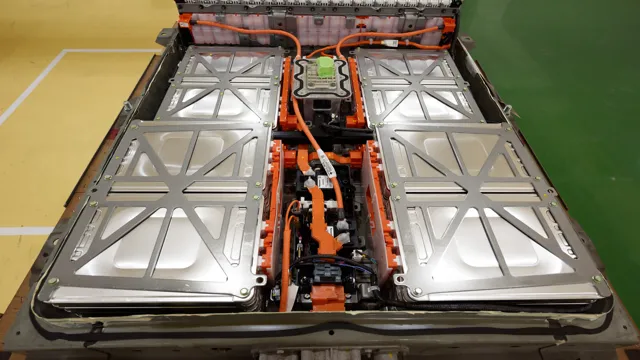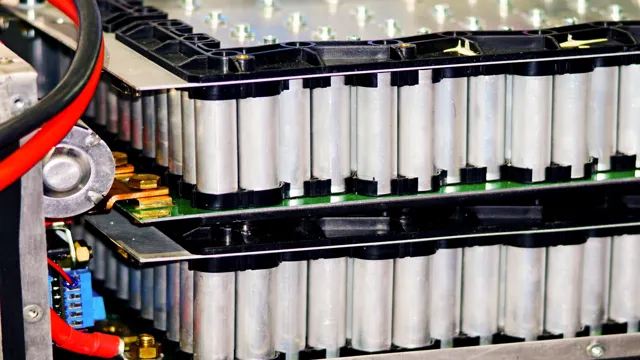Electrify Your Drive: Powering Up with Electric Car Battery Technology
Picture a world where cars run solely on clean, sustainable energy. It may sound like a futuristic pipe dream, but with the rise of electric vehicles, that reality may not be too far off. The driving force behind these electric cars is their powerful batteries, which are responsible for powering every mile travelled.
From small city cars to massive semi-trucks, battery technology is being pushed to new limits as we strive for a greener future. But what exactly makes these batteries so special, and how are they changing the way we think about transportation? In this blog, we’ll explore the world of electric car batteries and how they’re shaping our future.
The Basics of Electric Car Batteries
Electric car batteries are the heart of electric vehicles, powering their motors and providing the energy needed to get from point A to point B. These batteries are made up of thousands of individual battery cells, each of which contains a positive and negative electrode, as well as an electrolyte solution that allows ions to flow between the two electrodes. When the car is plugged in, an onboard charger converts AC power from the grid into DC power that can be stored in the battery.
The amount of energy that a battery can store depends on its capacity, which is measured in kilowatt hours (kWh). Generally speaking, the more kWh a battery has, the longer the vehicle can travel on a single charge. While electric car batteries are constantly improving in terms of energy density, charging time, and lifespan, they remain one of the most expensive components of an electric vehicle.
Nonetheless, as technology continues to advance, it is expected that electric car battery powered vehicles will become more affordable and accessible to consumers.
How They Work
Electric car batteries are a crucial component of electric vehicles, and they work differently than the conventional batteries found in gas-powered cars. The main difference is that electric car batteries use chemical reactions to store and release electrical energy instead of burning fuel. The battery pack consists of several individual cells that are linked together, and each cell is made up of a positive electrode, a negative electrode, and an electrolyte solution.
When the car is in use, electricity is generated by the chemical reactions that occur between these materials, and it flows through a circuit to power the motor. One of the major benefits of electric car batteries is that they are rechargeable, meaning they can store energy from both regenerative braking and plugging the car into an electric charging station. This is a much more sustainable and eco-friendly way to power a vehicle, as it eliminates the need for fossil fuels and reduces carbon emissions.
Overall, electric car batteries are a critical piece of technology that allows electric vehicles to operate efficiently and sustainably.
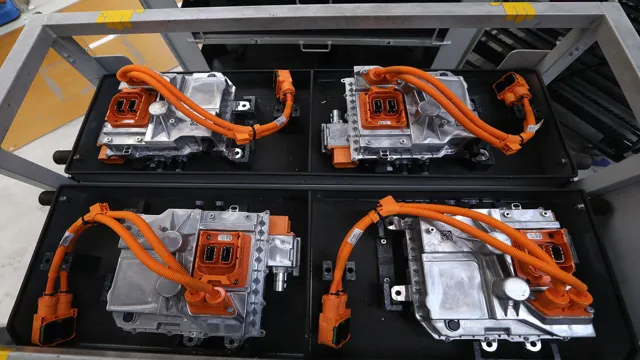
Types of Batteries
When it comes to electric cars, batteries are the lifeline of the vehicle. But did you know that there are different types of batteries that can be used? The most common types are lead-acid, nickel-metal hydride (NiMH), and lithium-ion (Li-ion). Lead-acid batteries are the oldest and most widely used type of battery; they are cheap and reliable, but heavy and not very efficient.
NiMH batteries are more expensive, but have a higher energy density and are more efficient. However, they are also heavier and wear out faster than Li-ion batteries, which are the most expensive but also the most efficient, lightweight, and long-lasting. So, when it comes to electric car batteries, it ultimately comes down to a tradeoff between cost, efficiency, and performance.
Are you willing to pay more upfront for a battery that will save you money in the long run? Or are you looking for a cheaper option that might not be as efficient? It’s a decision that each individual electric car buyer has to make based on their specific needs and budget.
Advantages of Battery-Powered Electric Cars
Electric car battery-powered vehicles provide several advantages over traditional gasoline-powered cars. Firstly, they are environmentally friendly as they emit zero or extremely low levels of harmful pollutants, contributing to air pollution reduction and improved air quality. Secondly, electric cars don’t require oil changes and other routine maintenance associated with traditional engines, which translates into cost savings in terms of maintenance expenses.
Thirdly, electric cars don’t rely on fossil fuels, reducing our dependence on non-renewable resources. Fourthly, electric cars are typically quieter than traditional cars, making for a more comfortable and peaceful driving experience. Lastly, electric cars have been found to be more energy efficient compared to conventional cars, meaning they require less energy to achieve the same mileage.
With all these advantages, it’s no surprise that more and more people are opting for battery-powered electric cars as a reliable and sustainable mode of transportation.
Environmental Benefits
Environmental Benefits Battery-powered electric cars offer numerous environmental benefits over traditional gasoline-powered vehicles. First and foremost, electric cars produce zero emissions, which means they do not release harmful pollutants into the air while driving. This is a major advantage, particularly in urban areas, where air pollution is a major concern.
Additionally, while the production of electricity used to power electric cars may generate greenhouse gas emissions, the overall carbon footprint of electric cars is still significantly lower than that of traditional gasoline-powered vehicles. Electric cars also have the potential to reduce dependence on foreign oil and promote energy independence, as they can be powered by domestically sourced renewable energy sources like wind and solar power. In addition to these benefits, electric cars offer many other advantages, including lower operating costs, quieter operation, and a smoother driving experience.
All of these factors make electric cars an attractive option for environmentally conscious consumers, as well as those looking to save money on gas and maintenance.
Efficiency and Performance
Electric cars powered by batteries have several advantages over traditional gasoline-powered vehicles. One of the main advantages is their efficiency. Battery-powered electric cars can convert up to 62% of the energy stored in the battery into power that drives the car, which is much higher than the 20% to 30% conversion rates of gasoline-powered engines.
Additionally, because electric motors have fewer moving parts than gasoline engines, they require less maintenance and ultimately have a longer lifespan, reducing costs in the long run. Another significant advantage of battery-powered electric cars is their performance. They have instant torque, meaning they can accelerate from 0 to 60 mph in just a few seconds.
Moreover, electric cars are quieter than traditional vehicles because their engines do not have to work as hard. All in all, battery-powered electric cars are a great choice for those who want to reduce their environmental impact and save money in the long run, while also enjoying a powerful and efficient driving experience.
Cost Savings
When it comes to choosing a car, many people focus solely on the upfront costs. However, those who opt for battery-powered electric cars have the added benefit of cost savings in the long run. While electric cars may have a higher sticker price initially, they save money on fuel, maintenance, and repairs.
With no need for gas, the cost to power an electric car is significantly lower than that of a traditional gasoline-powered vehicle. Additionally, electric cars have fewer parts and require less maintenance, resulting in lower repair costs over time. By choosing an electric car, not only are you helping the environment, but you’re also saving money in the process.
And with governmental incentives available in some areas, the cost savings can be even greater. So, the next time you’re in the market for a new vehicle, consider the advantages of a battery-powered electric car.
Battery-Powered Electric Car Models Available Today
If you’re looking for an eco-friendly way to get around, you might be interested in investing in an electric car battery-powered vehicle. Luckily, there are plenty of options available on the market today. Some of the highest-rated models include the Tesla Model S, the Chevrolet Bolt, the Nissan Leaf, and the BMW i
Each of these vehicles has its own unique features and benefits, so it’s important to do your research and figure out which one will work best for your specific needs and budget. One thing to keep in mind is that while the initial cost of an electric car battery-powered vehicle may be higher than a traditional gasoline-powered car, you’ll save money in the long run due to the lower cost of electricity for charging and the reduced need for regular maintenance. So, if you’re ready to make the switch to a more sustainable mode of transportation, consider investing in an electric car battery-powered vehicle.
Tesla Model S
When it comes to eco-friendly and sustainable transportation, electric cars are leading the charge. One of the most popular battery-powered models available today is the Tesla Model S. This sleek and stylish sedan has a driving range of up to 402 miles on a single charge, making it perfect for long trips and daily commutes.
It’s also packed with advanced features like a touchscreen infotainment system, autopilot capabilities, and a panoramic sunroof. With its silent and smooth ride, the Model S is a joy to drive, and its zero-emission electric motor makes it an environmentally conscious choice. Plus, with Tesla’s Supercharger network, you can recharge your battery quickly and easily, giving you peace of mind on even the longest of journeys.
So, if you’re looking to switch to an electric car, the Tesla Model S is definitely worth considering.
Nissan Leaf
The Nissan Leaf is a popular battery-powered electric car model that has captured the attention of eco-conscious drivers around the world. With a sleek and stylish design, this car is not only eco-friendly but also a joy to drive. The Leaf has a range of up to 150 miles on a single charge, making it a practical choice for daily commuting and short trips around town.
The car is equipped with regenerative braking, which allows the battery to recharge while driving, making it even more efficient. The Nissan Leaf is one of the many battery-powered electric car models available today, and it continues to be a top choice for drivers who want a greener and more sustainable future.
The Future of Electric Car Batteries
Electric car battery technology has advanced rapidly in recent years, and it appears this trend will continue. Battery life has been one of the most significant concerns with electric cars, but improvements in battery technology have resulted in vehicles that can drive much farther on a single charge. Battery scientists are working on developing batteries that can power cars for longer distances, charge faster, and cost less.
Researchers are experimenting with new materials, such as solid-state batteries, which could improve performance even further. Other advances include reducing the size and weight of batteries and increasing their compatibility with renewable energy sources like solar power. As these developments continue, it is becoming increasingly likely that electric cars will become the norm on our roads in the near future.
Advancements in Technology
The future of electric car batteries looks bright thanks to advancements in technology. Companies like Tesla are at the forefront of this movement, constantly innovating and pushing the boundaries of what’s possible. One of the biggest challenges in this field has been developing batteries that can hold enough charge to rival traditional gasoline engines.
However, with new materials like solid-state electrolytes, researchers are making progress towards creating batteries that can go up to 500 miles on a single charge. As this technology becomes more readily available, we could see electric cars become the norm rather than the exception. Imagine never having to stop at a gas station or worry about emissions again! It’s an exciting time to be in the electric car industry, and the future looks brighter than ever.
Potential for Mass Adoption
Electric car batteries have come a long way, and their potential for mass adoption is closer than we think. In recent times, battery technology has improved significantly, making electric vehicles more efficient, reliable, and affordable. As the demand for greener technology increases, manufacturers are investing heavily in developing new battery technologies that are capable of storing more energy and recharging faster.
With advancements in technology, electric vehicles are expected to achieve the same range as gasoline-powered cars, and the cost of battery packs is expected to drop exponentially. As a result, mass adoption of electric vehicles is only a matter of time. In fact, many experts predict that electric vehicles will eventually dominate the market, and gasoline-powered cars will become obsolete.
As society becomes increasingly aware of the impact of vehicles on the environment, the demand for electric cars will rise, which will further drive innovation in electric car batteries. The future of electric car batteries is bright, and with the right investments, we can expect to see significant progress in this field in the coming years.
Impact on Society
As the demand for electric vehicles continues to rise, there are questions about the future of their batteries. The current lithium-ion batteries have limitations, including their range, charging time, and lifespan. However, advancements in technology are leading to the development of new, more efficient batteries.
For instance, solid-state batteries have the potential to be lighter, smaller, and more energy-dense than current batteries. They could also charge faster and have a longer lifespan. These batteries could not only revolutionize the electric vehicle industry but also impact society as a whole.
With longer range and faster charging times, electric cars could become more accessible to the general public, reducing greenhouse gas emissions and air pollution. The impact on society could be significant, as the transition to electric vehicles could help create a cleaner and more sustainable future.
Conclusion
In conclusion, electric car batteries are like the humble engine of yesteryear, but with a modern twist. Instead of burning fossil fuels and emitting harmful pollutants, these batteries are powered by clean and renewable energy. They are the driving force behind a sustainable and eco-friendly transportation revolution.
So, let’s ditch the gas guzzlers and embrace the electric car battery powered movement – because the future is electric!”
FAQs
What is an electric car battery powered?
An electric car battery powered means that the vehicle runs solely on electricity stored in rechargeable batteries, rather than gasoline or diesel fuel.
How long does an electric car battery last?
It depends on the make and model of the car, as well as how often it is used and charged. On average, an electric car battery can last anywhere from 8 to 20 years.
How do I charge my electric car battery?
You can charge your electric car battery by plugging it into a charging station at home or at designated charging stations in public places. Some electric cars also have the option to charge their batteries with regenerative braking, which converts kinetic energy back into battery power.
How much does it cost to replace an electric car battery?
The cost of replacing an electric car battery can vary greatly depending on the make and model of the car, as well as the type of battery. On average, it can cost anywhere from $3,000 to $10,000. However, many electric car manufacturers offer warranties and other programs that can help cover the cost of replacement.

